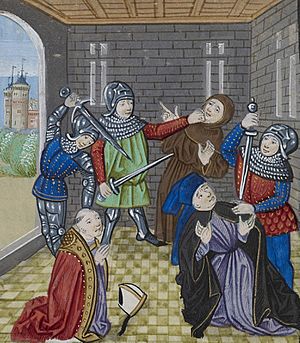Robert Hales facts for kids
Quick facts for kids
Sir
Robert Hales
|
|
|---|---|

The murder of Archbishop Simon Sudbury and Hales at the Tower of London
|
|
| Born | c. 1325 High Halden, Kent, England |
| Died | 14 June 1381 (aged 55–56) Tower Hill, London, England |
| Service years | 1372–1377 |
| Rank | Admiral of the West |
Sir Robert Hales (born around 1325 – died June 14, 1381) was an important figure in England during the 1300s. He was the leader of the Knights Hospitaller in England, a group of knights who helped sick people and fought in wars. He also held two very important government jobs: Lord High Treasurer and Admiral of the West. Sadly, he was killed during a big uprising called the Peasants' Revolt.
Contents
Sir Robert Hales's Important Roles
Sir Robert Hales held several powerful positions in England. These roles gave him a lot of responsibility. Let's explore what each of these jobs meant.
Leader of the Knights Hospitaller
In 1372, Robert Hales became the Grand Prior of the Knights Hospitaller in England. The Knights Hospitaller were a special group of knights. They started during the Crusades, which were religious wars. Their main job was to protect pilgrims and care for sick people. They had hospitals and forts in many places. As Grand Prior, Hales was the top leader for this group in England.
England's Chief Money Manager
King Richard II chose Sir Robert Hales to be the Lord High Treasurer. This was a very important job. The Lord High Treasurer was in charge of all the government's money. This meant Hales had to collect taxes from people. One of these taxes was the poll tax. This tax made everyone pay the same amount of money, no matter how rich or poor they were. Many people hated this tax because it was unfair to poorer families.
From November 1376 to November 1377, Sir Robert Hales was also the Admiral of the West. An admiral is a high-ranking naval officer. In this role, Hales was responsible for the ships and sailors protecting England's western coast. He made sure the navy was strong and safe from enemies.
The Peasants' Revolt and Sir Robert's Death
The Peasants' Revolt was a major uprising in England. Many common people were angry about high taxes, especially the poll tax. They were also upset about their living conditions. Sir Robert Hales, as the Lord High Treasurer, was seen as a symbol of these unfair taxes.
On June 14, 1381, the rebels marched to London. They captured the Tower of London. Sir Robert Hales was there, along with other important officials. The rebels found him and tragically killed him on Tower Hill. This event showed how much the people disliked the government's policies at the time.
Sir Robert's Legacy
Even though he was killed by the rebels, Sir Robert Hales was remembered by some. A writer named Thomas Walsingham described him as a "Magnanimous knight." This means he was seen as a brave and generous person, even if the common people didn't like him because of his role in collecting taxes. After his death, his brother, Sir Nicholas de Hales, inherited his family's lands and wealth.
Family Background
Sir Robert Hales was the son of Nicholas Hales. His brother, Sir Nicholas de Hales, continued the family name. The Hales family owned estates in Kent, a county in England.
| Political offices | ||
|---|---|---|
| Preceded by Thomas Brantingham |
Lord High Treasurer 1381 |
Succeeded by Sir Hugh Segrave |
| Military offices | ||
| Preceded by William Montagu |
Admiral of the West 24 November 1376 – 24 November 1377 |
Succeeded by Michael de la Pole Admiral of the North and West |
 | Delilah Pierce |
 | Gordon Parks |
 | Augusta Savage |
 | Charles Ethan Porter |

